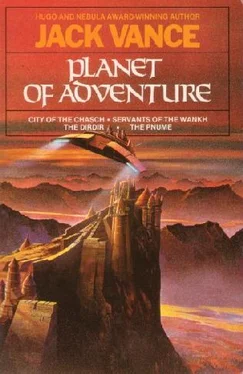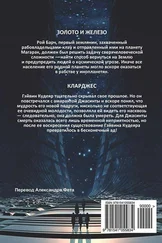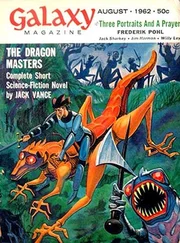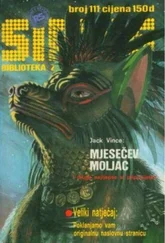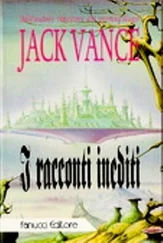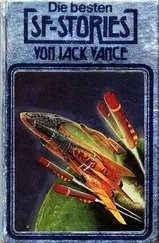Jack Vance - Planet of Adventure
Здесь есть возможность читать онлайн «Jack Vance - Planet of Adventure» весь текст электронной книги совершенно бесплатно (целиком полную версию без сокращений). В некоторых случаях можно слушать аудио, скачать через торрент в формате fb2 и присутствует краткое содержание. Жанр: Фантастика и фэнтези, на английском языке. Описание произведения, (предисловие) а так же отзывы посетителей доступны на портале библиотеки ЛибКат.
- Название:Planet of Adventure
- Автор:
- Жанр:
- Год:неизвестен
- ISBN:нет данных
- Рейтинг книги:4 / 5. Голосов: 1
-
Избранное:Добавить в избранное
- Отзывы:
-
Ваша оценка:
- 80
- 1
- 2
- 3
- 4
- 5
Planet of Adventure: краткое содержание, описание и аннотация
Предлагаем к чтению аннотацию, описание, краткое содержание или предисловие (зависит от того, что написал сам автор книги «Planet of Adventure»). Если вы не нашли необходимую информацию о книге — напишите в комментариях, мы постараемся отыскать её.
Planet of Adventure — читать онлайн бесплатно полную книгу (весь текст) целиком
Ниже представлен текст книги, разбитый по страницам. Система сохранения места последней прочитанной страницы, позволяет с удобством читать онлайн бесплатно книгу «Planet of Adventure», без необходимости каждый раз заново искать на чём Вы остановились. Поставьте закладку, и сможете в любой момент перейти на страницу, на которой закончили чтение.
Интервал:
Закладка:
They were underway. Behind lay Pagaz Zone and the way to Foreverness. Ahead was darkness and the Northern Areas.
CHAPTER FOUR
THE BARGE CARRIED a crew of two, who kept to the apron at the bow of the barge.
Here was a small pantry, a cook-bench, an island of dim yellow illumination.
There seemed to be at least two other passengers aboard, perhaps as many as three or four, who were even less obtrusive than the crew, and manifested themselves only at the pantry and the cook-bench. The food seemed to be free to the use of all. Zap 210 would not allow Reith to go forward for food. When the pantry and cook-bench were not in use Zap 210 procured food for both: cakes of pilgrim-pod meal, candied plum-shaped objects which might have been fruit or possibly leech-like insects, bars of meat-paste, sweet and salty wafers of a delicate crisp white substance which Zap 210 considered a delicacy, but which left an unpleasant aftertaste in Reith's mouth.
Time passed: how long Reith had no way of knowing. The lake became a river which in turn became an underground canal fifty or sixty feet wide. The barge moved without a sound, propelled, so Reith guessed, by electric fields cycling along the keel. Ahead gleamed a dim blue light serving as a fix for the barge's steering sensor; when one blue light passed overhead, another always shone far ahead. At long intervals the barge passed lonesome little piers and docks, with passages leading away into unknown fastnesses.
Reith ate and slept; how many times he lost count. His cosmos was the barge, the dark, the unseen water, the presence of Zap 210. With nothing but time and boredom, Reith set himself to the task of exploring her personality. Zap 210, on her part, treated Reith with suspicion, as if begrudging even the intimacy of conversation: a skittishness and prim reserve peculiar in a person who, to the best of his knowledge, had not even a distorted understanding of ordinary sexual processes. Primordial instinct at work, Reith surmised. But how in good conscience could he turn her loose on the surface in such a condition of innocence? On the other hand the prospect of explaining human biology to Zap 210 was not a comfortable one.
Zap 210 herself never seemed to become bored with the passage of time; she slept or sat looking off into the darkness as if she watched passing vistas of great fascination. Vexed with her self-sufficiency, Reith would occasionally join her, taking no notice of her slight shift of fastidious withdrawal. Conversation with Zap 210 was never exhilarating. She had unalterable preconceptions regarding the surface: she feared the sky, the wind, the space of the horizons, the pale brown sunlight. Her anticipations were melancholy: she foresaw death under the club of a yelling barbarian. Reith tried to modify her views but encountered distrust.
"Do you think that we are ignorant of the surface?" she asked in calm scorn.
"The zuzhma kastchai know more than anyone; they know everything. Knowledge is their existence. They are the brain-life of Tschai; Tschai is body and bones to the zuzhma kastchai."
"And the Pnumekin: how do they fit into the picture?"
"The 'persons'? Long ago the zuzhma kastchai gave refuge to certain men from the surface, with some females and some mother-women. The 'persons' proved their diligence by polishing stones and perfecting crystals. The zuzhma kastchai provided peace, and so it has been, for all the ages."
"And where did men come from originally, do you know this?"
Zap 210 was uninterested. "From the ghian, where else?"
"Do they teach you of the sun and the stars and the other worlds of space?"
"They teach what we most want to learn, which is decorum and good conduct." She heaved a small sigh. "That is all behind me and gone; how the others would marvel at me now!"
So far as Reith could comprehend, Zap 210's principal emotion appeared to be for her own indecorous conduct.
The barge moved on. Blue glimmer appeared ahead, waxed to become a glare and pass overhead, with a new blue glimmer far in the distance. Reith became stale and restless. Darkness was almost complete, relieved only by a vague glow from the bow apron forward. The feminine voice of Zap 210, herself only a blur, began to work upon his imagination; certain of her mannerisms took on the semblance of erotic provocations. Only by conscious rational effort could he maintain his impersonality. How, he would ask himself, could she provoke or tease when she was totally unaware of the male-female relationship? Any urgings from her subconscious must seem a peculiar perversion, the most exaggerated form of
"boisterous conduct." He remembered the vitality of her body when she had clung to him in the water; he thought of the look of her soaked body; he began to wonder if his instincts might not be more accurate than his reason. Zap 210, if she felt anything other than glumness and foreboding, gave no evidence, except a somewhat greater willingness to talk. For hours she spoke in a low monotone, of everything she knew. She had lived a remarkably drab life, thought Reith, without experience of gaiety, excitement, frivolity. He wondered as to the content of her imaginings, but of this she said nothing. She recognized differences in the personalities of her fellows: subtle variations of decorum and discretion which to her assumed the same significance as the more vehement personality traits of the surface. She was aware of biological differences between male and female, but apparently had never wondered as to their justification. All very strange, mused Reith. The Shelters would seem to be an incubator for a whole congeries of neuroses. Reith dared venture no inquiries; whenever the conversation skirted such matters, she became instantly taciturn.
Had the Pnume bred sex drive out of the Pnumekin? Did they administer depressants, drugs, hormones, to eliminate a troublesome tendency to over-reproduce? Reith asked a few cautious questions, to which Zap 210 gave such irrelevant and unapposite replies that Reith was sure she didn't know what he was talking about. From time to time, Zap 210 admitted, certain persons found the Shelters too staid; they were sent up to the surface, into the glare, the blowing winds, the empty nights with all the universe exposed, and never allowed to return below. "I wonder that I am not more fearful," she said. "Is it possible that I have always had Gzhindra tendencies? I have heard that so much space creates a distraction; I do not wish to be so affected."
"We're not on the surface yet," said Reith, to which Zap 210 gave a faint shrug, as if the matter were of no great importance.
Regarding the reproductive mechanisms of the Pnume she had no sure knowledge; she was uncertain whether or not the Pnume regarded the matter as secret, though she suspected as much. As to the relative number of Pnume and Pnumekin she was also uncertain. "There are probably more zuzhma kastchai. But many are never seen; they keep to the Deep Places, where the precious things are kept."
"What precious things?"
Again Zap 210 was vague. "The history of Tschai goes back beyond thought; just so far back go the records. The zuzhma kastchai are meticulous; they know everything that has ever happened. They consider Tschai to be a great conservatory, where every item, every tree, every rock is a cherished curio. Now there are off-world folk on the ghian: three different sorts, who have come to leave their artifacts."
"Three?"
"The Dirdir, the Chasch, the Wankh."
"What of men?"
"'Men'?" Her voice took on a dubious tone. "I don't know. Perhaps men too are off-world. If so, four peoples sojourn in Tschai. But this has happened before; many times have strange folk come down to Old Tschai. The zuzhma kastchai neither welcome nor repel; they observe, they watch. They expand their collections; they fill the museums of Foreverness; they compile their archives."
Читать дальшеИнтервал:
Закладка:
Похожие книги на «Planet of Adventure»
Представляем Вашему вниманию похожие книги на «Planet of Adventure» списком для выбора. Мы отобрали схожую по названию и смыслу литературу в надежде предоставить читателям больше вариантов отыскать новые, интересные, ещё непрочитанные произведения.
Обсуждение, отзывы о книге «Planet of Adventure» и просто собственные мнения читателей. Оставьте ваши комментарии, напишите, что Вы думаете о произведении, его смысле или главных героях. Укажите что конкретно понравилось, а что нет, и почему Вы так считаете.
